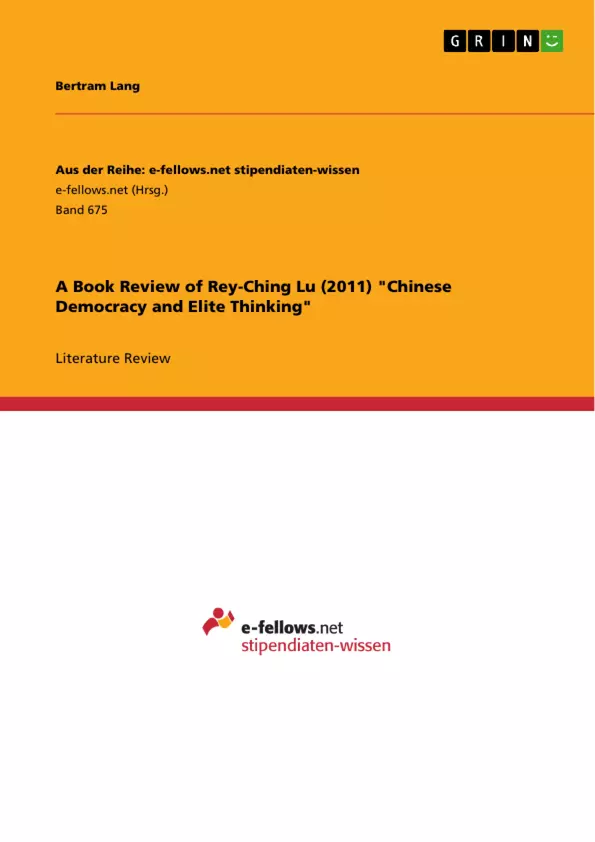The question whether China will or will not follow a path of democratic reforms in the near future has been repeatedly asked by many scholars over the last years, even decades. Since the beginning of China's economic reforms and development, modernisation theorists have always been in the front-line when it came down to predicting the country's soon-to-come political liberalisation.
However, after decades of contradictory results of quantitative studies on the alleged causal relationship between economic development and democracy, there is growing consent to Seymour Martin Lipset’s statement that “[w]hether democracy succeeds or fails continues to depend significantly on the choices, behaviors, and decisions of political leaders and groups” (Lipset 1994: 18).
Completely in line with what the German political scientist Wolfgang Muno describes as the “need for qualitative analyses of […] important actors, concepts and strategies” (Muno 2001: 50) in the debate about democracy and development, Rey-Ching Lu’s recently published book “Chinese democracy and elite thinking” focuses upon the ideas and convictions of a few members of the mainland’s elite, from which he draws conclusions about China’s political development in the next couple of years. The underlying assumption is that, contrary to many Western theorists’ beliefs, it is neither the middle class nor the economic liberalisation in itself that will spark democracy ‘from the bottom’, but rather the changing attitudes of the more and more globalised social elite that will eventually lead to a top-down process of political reform and liberalisation.
This book review focuses on the most important aspects of Lu’s methodological approach and line of argument. After a presentation of his methodological proceeding, the main findings and conclusions of Lu’s study will be described and discussed. Then, a critical assessment of the author’s arguments will be made, also considering other scholars’ views on the issues of China’s possible democratization and the role of its elites in this process.
Inhaltsverzeichnis (Table of Contents)
- Introduction
- Methodological considerations
- Findings and prognoses
- Critical assessment
- Conclusion
- References
Zielsetzung und Themenschwerpunkte (Objectives and Key Themes)
The book "Chinese Democracy and Elite Thinking" by Rey-Ching Lu aims to investigate the potential for democratization in China through a focus on the attitudes of the Chinese elite.
- Historical analysis of China's elite thinking
- Influence of Confucianism on Chinese democracy
- Role of Shanghai in the future of Chinese democracy
- Relationship between economic development and democracy
- Impact of Western ideas on Chinese society
Zusammenfassung der Kapitel (Chapter Summaries)
The first part of the book examines the evolution of Chinese elite thinking through four historical periods: the waning Qing Dynasty, the Republican era, Mao Zedong's rule, and the Reform era. Lu analyzes the ideas of leading intellectuals in each period and their impact on societal change.
The second part of the book presents the results of interviews conducted with members of the Chinese elite in Shanghai. The author analyzes their perspectives on Shanghai's development, the role of the government, and the future generation, drawing conclusions about their attitudes towards democracy.
Schlüsselwörter (Keywords)
The book "Chinese Democracy and Elite Thinking" examines the complex relationship between Chinese culture, historical development, and democratic aspirations. It explores the roles of Confucianism, elite thinking, economic liberalization, and Western influences in shaping China's political landscape. The author analyzes key figures like Liang Qichao, Hu Shi, and Mao Zedong and their contributions to Chinese political thought.
Frequently Asked Questions
Will China follow a path of democratic reform?
The book argues that political liberalization in China depends significantly on the decisions and changing attitudes of its social elite.
What is the role of the elite in China's democratization?
Contrary to Western theories focusing on the middle class, Rey-Ching Lu suggests a "top-down" process led by a globalized elite.
How does Confucianism influence Chinese democracy?
The analysis explores how traditional values and elite thinking from the Qing Dynasty to the present shape modern political aspirations.
Why is Shanghai important in this study?
Lu conducted interviews with the elite in Shanghai to draw conclusions about the future generation's attitudes toward democracy.
Is there a direct link between economic growth and democracy in China?
The book challenges the simple causal relationship, emphasizing that elite choices are more decisive than economic liberalization alone.
- Arbeit zitieren
- Bertram Lang (Autor:in), 2012, A Book Review of Rey-Ching Lu (2011) "Chinese Democracy and Elite Thinking", München, GRIN Verlag, https://www.grin.com/document/211217



